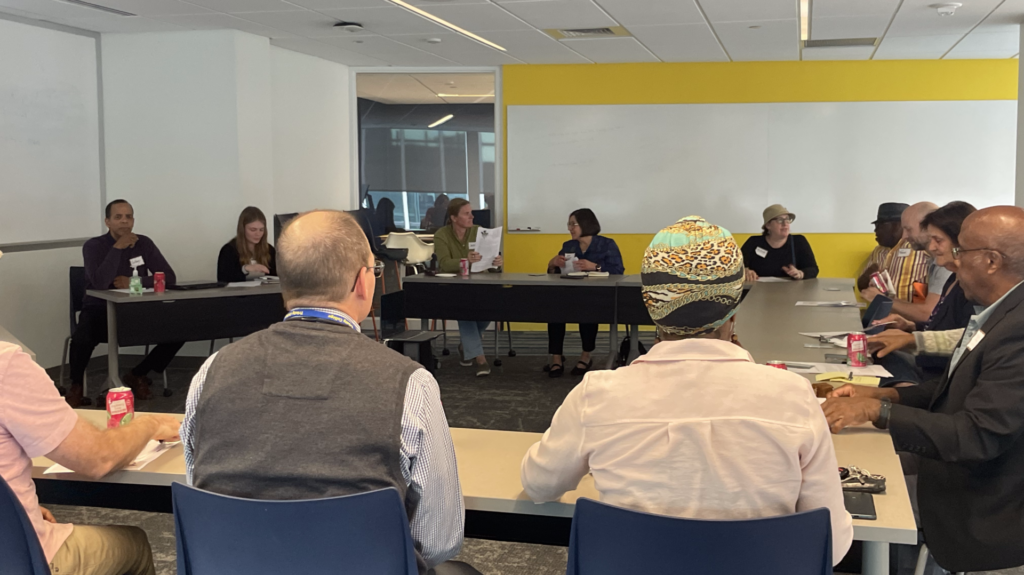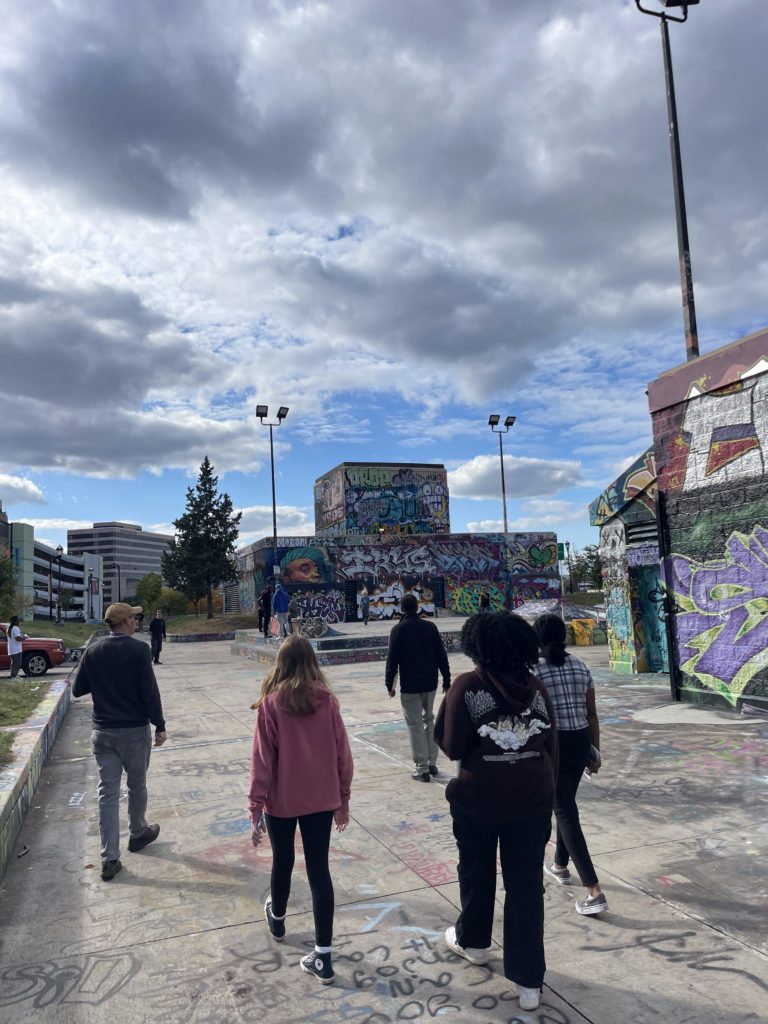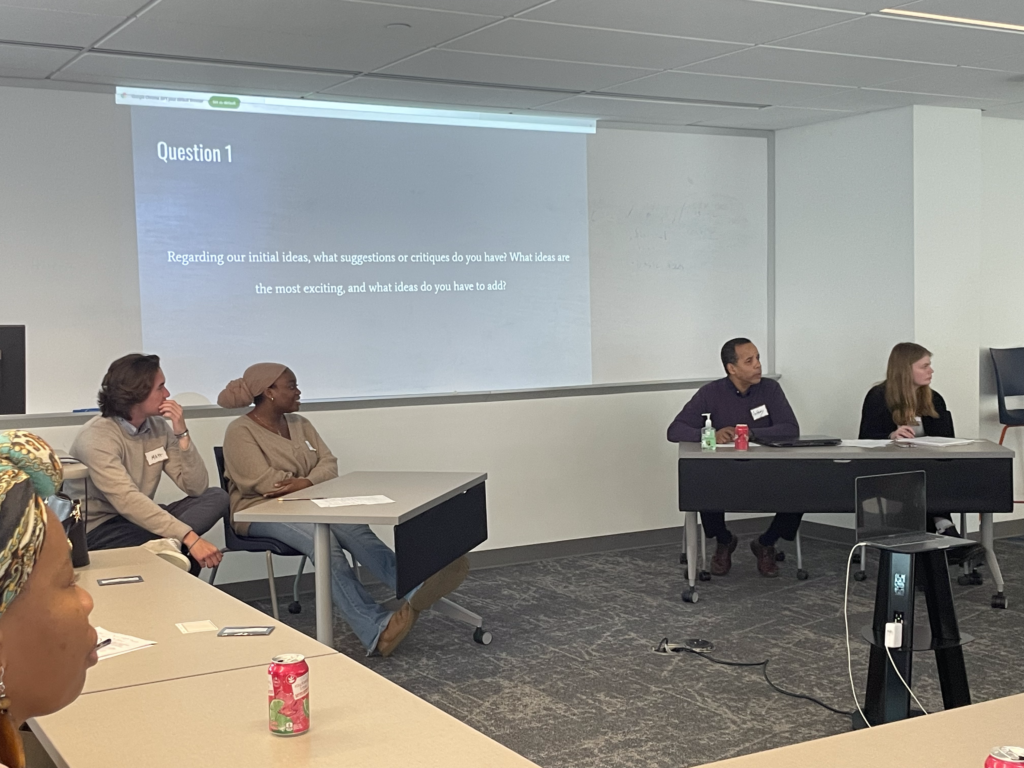TABLE OF CONTENTS

For this project, we adopted a structured, collaborative approach to data collection through a series of focus groups. Each group was carefully designed to provide distinct insights relevant to our objectives, and the sequence of discussions informed the development of our ultimate proposals and recommendations.
Commemoration Boot Camp

The initial weeks of our project were dedicated to an intensive learning phase, which we referred to as the “Commemoration Boot Camp.” During this time, our student team was immersed in the history of the Talcott Street Church, and broader concepts of historical preservation. This foundational work was critical in equipping us with the knowledge and context needed to approach the project with respect, depth, and accuracy.
- Historical Context and Preservation Education
We hosted a series of presentations from experts in various fields, each providing valuable insights to deepen our understanding:- Talcott Street Church History: New research about the Talcott Street Church and its pivotal role in African American history. (Presentation by Melvin Graham, Faith Congregational Church)
- Archival Research and Preservation: Professionals in historical preservation educated us on methods of using archives to uncover and safeguard the stories of the past. (Presentation by Christina Bleyer, Watkinson Library, Trinity College)
- Architectural Commemoration: Learned the significance of architectural elements in commemorating African American history and shared best practices for designing commemorative spaces. (Presentation by Priyanka Panjwani, Preservation Architect, and Professor Ira Hessmer, Architectural Engineering Technology Program Coordinator, CT State Capital)
- Exploring Local Commemoration Efforts
To contextualize our project, we explored various commemorative landmarks throughout the city. This hands-on experience highlighted the stark contrast between what has been commemorated and the absence of recognition for the vital history represented by Faith Congregational Church and its predecessor, the Talcott Street Church. This comparison emphasized the importance of our work and deepened our commitment to addressing this historical oversight
By the end of the boot camp, our team was well-prepared to approach the project with a comprehensive understanding of historical preservation, the importance of commemoration, and the significant legacy of Faith Congregational Church. This phase not only informed our strategies but also inspired our collective vision for how to honor and go about commemorating this crucial piece of American history.
Data Collection

- Cultural Leaders Focus Group
We began with a focus group comprising various cultural leaders from the Hartford area. Each participant represented unique organizations such as The Hartford Preservation Alliance, Democracy Center of The Old State House, The Amistad Center for Art and Culture, Center Church, Faith Congregational church and the iQUILT project. providing valuable perspectives that enriched our understanding of the broader cultural and historical landscape relevant to our project. For this focus group we had 11 members and it lasted just over an hour. - Faith Congregational Church Members Focus Group
Our second focus group engaged directly with members of Faith Congregational Church. As representatives of the community we aim to honor and represent, their insights and experiences were foundational to shaping our approach and ensuring the authenticity of our work. For this focus group we had 8 church members attend and the meeting took around an hour. - Interview with Noah Humphrey and Dr. Orisade Awodola We interviewed Noah Humphrey and Dr. Orisade Awodola, whose personal and professional connections to Reverend James Pennington brought unique depth to our project. Dr. Awodola, a direct descendant of Reverend Pennington, shared invaluable insights into her ancestor’s legacy, emphasizing the importance of preserving and celebrating his contributions to history. Noah Humphrey, who has been instrumental in advocating for Pennington to receive a posthumous diploma from Yale, provided context on the ongoing efforts to honor Pennington’s academic achievements and their broader significance.
- Connecticut DECD Members Focus Group
Based on the findings from the initial discussions, we conducted a focus group with members of the Connecticut Department of Economic and Community Development (DECD) and the Freedom Trail. This session provided critical input on policy and logistical considerations essential for formulating actionable recommendations. For this focus group we had 3 attendents and it lasted around 1 hour. - Roundtable Discussion with Key Stakeholders
The insights gathered from the DECD focus group culminated in a roundtable discussion. This final session brought together key organizations identified by DECD, allowing us to present our findings and proposals in a final pitch.
Data Analysis
Coding for Key Themes and Ideas
To analyze the rich data gathered during the focus groups, we transcribed each recording and applied a systematic coding process. Using qualitative data analysis techniques, we identified recurring themes, key ideas, and patterns in the participants’ discussions. This approach allowed us to:
- Highlight shared priorities across different groups
- Identify unique perspectives specific to each group’s focus
- Synthesize insights into actionable recommendations
The coding process provided a structured framework for organizing and interpreting the data, ensuring that the voices of all participants were accurately represented in our findings.
Ethical Considerations
For each focus group, we prioritized ethical practices by obtaining informed consent for any recordings or photography. Consent forms were distributed to all participants, ensuring their understanding and agreement to the use of such materials for documentation purposes. Our entire process went through Trinity Colleges Institutional Review Board.
This iterative, community-focused methodology ensured that the perspectives of all relevant stakeholders were included and respected, forming a well-rounded basis for our project outcomes.